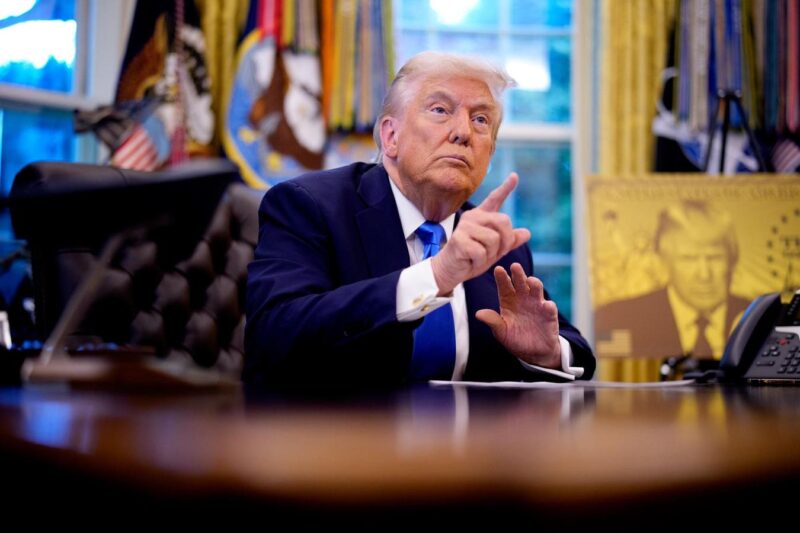WASHINGTON, DC – SEPTEMBER 19: President Donald Trump takes a question from a reporter before signing executive orders in the Oval Office at the White House on September 19, 2025 in Washington, DC. Trump signed two executive orders, establishing the “Trump Gold Card” and introducing a $100,000 fee for H-1B visas. The “Trump Gold Card” is a visa program that allows foreign nationals permanent residency and a pathway to U.S. citizenship for a $1 million investment in the United States. (Photo by Andrew Harnik/Getty Images)
Getty Images
When President Donald Trump announced last week that his administration would impose a $100,000 fee on new H-1B visa petitions, the shock was immediate.
The fee, which went into effect on September 21, 2025, applies to all new applications filed for foreign nationals abroad. It does not apply to renewals or existing visa holders, according to clarifications from the White House and U.S. Citizenship and Immigration Services.
The H-1B program, which allows U.S. companies to hire highly skilled foreign workers in “specialty occupations” such as technology, healthcare, engineering and finance, has long been a political flashpoint. For years, Trump allies including former White House strategist Steve Bannon have argued the visas depress wages for American workers. A White House spokesperson said in a statement that the new measure is a “common-sense action” designed to discourage companies from “spamming the system and driving down wages.”
However, the scale of the new fee — far higher than the standard $780 filing cost plus $215 lottery fee — is unprecedented. “There is not a single company that I have invested in the last 10 years that could afford to pay this,” veteran venture capitalist Alan Patricof told the Times. Matt Letourneau, a spokesman for the U.S. Chamber of Commerce, said in a statement the group was “concerned about the impact on employees, their families and American employers.”
What Changes And Who’s Affected?
The policy applies strictly to new applications from foreign nationals who are not already in the United States. Existing H-1B workers will not be asked to pay the fee for renewals, and their ability to travel in and out of the country under current visas remains unchanged. However, immigration attorneys say petitions for workers abroad changing employers or amending status, which could qualify as “new petitions” under the proclamation, could face ambiguity.
The administration has suggested limited exemptions could be made for national interest or security, but has not detailed how those might apply to healthcare providers, universities, or nonprofit research centers. That uncertainty has left employers scrambling.
Fallout For Tech, Healthcare and the Global Landscape
Nowhere is the impact expected to be felt more than in the technology and healthcare industries, both of which are deeply reliant on the H-1B program. In Silicon Valley, companies like Google, Microsoft and Meta file hundreds of visa petitions annually to bring in software engineers and data scientists — a $100,000 fee on each new hire could alter recruitment strategies overnight. While large firms may absorb the cost for senior or specialized roles, smaller startups could find sponsorship economically impossible.
Healthcare providers, particularly hospitals and academic medical centers, could witness their own strains: Foreign-trained physicians and researchers frequently fill gaps in specialties like radiology, pathology and internal medicine, and the new fee could deter applications and worsen shortages, especially in underserved rural areas. Unlike tech firms, many of these employers operate on thin margins or depend on public funding — without explicit carve-outs, their ability to recruit may shrink.
Meanwhile, roughly 70% of H-1B visa holders are Indian citizens, and outsourcing giants like Infosys, Tata Consultancy Services and Wipro have historically depended on the program. When news of the policy broke, shares in several Indian IT firms dropped, and India’s Ministry of External Affairs issued a statement calling the measure “likely to have humanitarian consequences by way of the disruption caused for families.”
Corporate America has reacted with alarm, but not everyone opposes the change. Netflix co-founder Reed Hastings called the fee a “great solution”, saying it ensures visas go to “very high-value jobs” and reduces the need for a lottery. Some conservative lawmakers echoed that sentiment, framing the policy as a way to prioritize American workers.
However, labor economists warn the long-term cost to U.S. innovation may outweigh any short-term wage protection. Studies have consistently shown H-1B workers contribute disproportionately to patents, startups and STEM research output — curtailing their entry could erode the United States’ competitiveness in artificial intelligence, biotech and advanced manufacturing, all industries where administrations overtly sought to expand foreign talent pipelines.
The proclamation leaves many questions unanswered: how broadly exemptions will be granted, whether universities, hospitals and other institutions will be carved out, and whether the courts will allow the fee to stand. Already, immigration advocates are preparing challenges, arguing the executive branch may have exceeded its authority in imposing such a sweeping financial barrier.
The more immediate reality, however, seems to be in the hands of firms, which may need to decide which foreign hires are worth a six-figure premium, while would-be H-1B applicants may need to weigh whether the U.S. remains an attractive destination for their careers.









